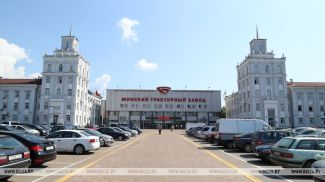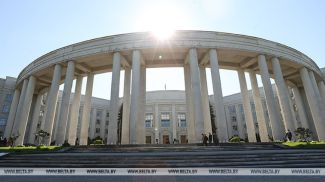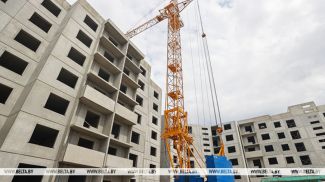VOLOZHIN DISTRICT, 17 July (BelTA) – The advisability of building certain components of dairy farms should be reevaluated. Prime Minister of Belarus Andrei Kobyakov gave the instructions on 17 July, BelTA has learned. The instructions were given during the onsite conference held at the dairy farm Dovbeni of the agricultural enterprise Bobrovichi operated by the Minsk Oblast gas service provider Minskoblgaz to discuss progress in the construction and reconstruction of dairy farms among other things.
Presenting his report on the matter, Minsk Oblast Governor Semyon Shapiro drew attention of the Prime Minister to a number of matters, in particular, the unjustified increase in the cost of construction services by project designers by adding unnecessary components or excessively expensive structures.
The Minsk Oblast Governor spoke against building disinfectant barriers at entrances of dairy farms. Such barriers are only harmful for dairy farms yet they are vital for poultry farms and pig farms. The construction of disinfectant barriers as part of dairy farms often deviates from construction standards. Trucks tend to bypass these barriers. So it turns out that these disinfectant barriers are totally useless. Still designers always add them in order to inflate project costs, stated the Minsk Oblast Governor.
The Prime Minister responded by speaking in favor of removing disinfectant barriers if scientists can absolutely objectively confirm that these barriers are unnecessary as part of this type of farms. “If the veterinary service insists, then the barriers will have to be properly built,” said Andrei Kobyakov.
According to Semyon Shapiro, disinfectant barriers are not the only component that designers use to inflate construction costs. He spoke against installing insulating glass units at dairy farms (the rules require the premises to be well-aired), expensive lightning rods and many other things.
In turn, the Prime Minister said the state of affairs can be fixed by better organization of the work. He said that the Minsk Oblast committee for agriculture and food can set up a team to oversee construction efforts. “There is a sufficient number of professional construction workers in Minsk Oblast. They can be employed to straighten out construction design and force contractors to build things properly,” said Andrei Kobyakov.
According to Semyon Shapiro, heads of agricultural enterprises have been kind of relaxed in the last few years. In the past agricultural enterprises relied on their own resources in farm construction. Now agricultural enterprises invite specialized construction companies, thus inflating the costs. “After that they face a dilemma: they either have to raise salaries for their workers or spend money on repaying construction debts. Unfortunately, we face certain financial problems today due to this approach,” noted the Minsk Oblast Governor.
Semyon Shapiro shared the experience of Minsk Oblast. A program is in progress in the region. Every agricultural enterprise that has to build a farm and is ready and capable of doing it gets money from the oblast budget. Design work is done, reinforced concrete structures are transported and installed. After that the agricultural enterprise has to use its own resources to build the floor, sides of the building, and roof the building across reinforced-concrete slabs. A farm like that costs at most Br1.5 billion, with Br1 billion allocated by the oblast budget. In order to expedite the process, agricultural enterprises are encouraged to finish the construction of farms within three months. If an agricultural enterprise fails to build a farm within three months, it will have to repay Br1 billion to the oblast budget. If the farm is built within three months, Br1 billion is written off as state aid (the money is used to enlarge the state share in the joint-stock company). According to Semyon Shapiro, the agricultural enterprises that keep farm construction costs down to Br500 million can also count on state aid.
Presenting his report on the matter, Minsk Oblast Governor Semyon Shapiro drew attention of the Prime Minister to a number of matters, in particular, the unjustified increase in the cost of construction services by project designers by adding unnecessary components or excessively expensive structures.
The Minsk Oblast Governor spoke against building disinfectant barriers at entrances of dairy farms. Such barriers are only harmful for dairy farms yet they are vital for poultry farms and pig farms. The construction of disinfectant barriers as part of dairy farms often deviates from construction standards. Trucks tend to bypass these barriers. So it turns out that these disinfectant barriers are totally useless. Still designers always add them in order to inflate project costs, stated the Minsk Oblast Governor.
The Prime Minister responded by speaking in favor of removing disinfectant barriers if scientists can absolutely objectively confirm that these barriers are unnecessary as part of this type of farms. “If the veterinary service insists, then the barriers will have to be properly built,” said Andrei Kobyakov.
According to Semyon Shapiro, disinfectant barriers are not the only component that designers use to inflate construction costs. He spoke against installing insulating glass units at dairy farms (the rules require the premises to be well-aired), expensive lightning rods and many other things.
In turn, the Prime Minister said the state of affairs can be fixed by better organization of the work. He said that the Minsk Oblast committee for agriculture and food can set up a team to oversee construction efforts. “There is a sufficient number of professional construction workers in Minsk Oblast. They can be employed to straighten out construction design and force contractors to build things properly,” said Andrei Kobyakov.
According to Semyon Shapiro, heads of agricultural enterprises have been kind of relaxed in the last few years. In the past agricultural enterprises relied on their own resources in farm construction. Now agricultural enterprises invite specialized construction companies, thus inflating the costs. “After that they face a dilemma: they either have to raise salaries for their workers or spend money on repaying construction debts. Unfortunately, we face certain financial problems today due to this approach,” noted the Minsk Oblast Governor.
Semyon Shapiro shared the experience of Minsk Oblast. A program is in progress in the region. Every agricultural enterprise that has to build a farm and is ready and capable of doing it gets money from the oblast budget. Design work is done, reinforced concrete structures are transported and installed. After that the agricultural enterprise has to use its own resources to build the floor, sides of the building, and roof the building across reinforced-concrete slabs. A farm like that costs at most Br1.5 billion, with Br1 billion allocated by the oblast budget. In order to expedite the process, agricultural enterprises are encouraged to finish the construction of farms within three months. If an agricultural enterprise fails to build a farm within three months, it will have to repay Br1 billion to the oblast budget. If the farm is built within three months, Br1 billion is written off as state aid (the money is used to enlarge the state share in the joint-stock company). According to Semyon Shapiro, the agricultural enterprises that keep farm construction costs down to Br500 million can also count on state aid.










